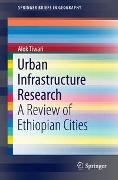Share
Fr. 69.00
Alok Tiwari
Urban Infrastructure Research - A Review of Ethiopian Cities
English · Paperback / Softback
Shipping usually within 1 to 2 weeks (title will be printed to order)
Description
This bookreviews contemporary research on urban infrastructure in 76 Ethiopian cities.It examines urban infrastructure issues in these cities and covers a wide rangeof topics from sustainability and smart cities to research methods employed byurban infrastructure investigators with regard to Ethiopian cities. Research onurban infrastructure legitimacies and modalities has established its valueworldwide in recent years, though it is still fairly young in the Ethiopiancontext.
The first chapter outlines ongoing issues of debate concerning urbaninfrastructures, including but not limited to discourses on sustainability, smartcities, innovative financing methods, and potential partnerships. Urbaninfrastructure issues in Ethiopian cities are examined in the second chapter, whilethe third chapter presents a review of the most relevant literature forresearchers. Findings show that the citations in the research reports aremainly from the materials available over the internet, including WHO,UN-Habitat and unpublished local materials. The fourth chapter identifiespatterns in the findings and recommendations of the research reports discussed.The results reveal that there is a wider gap between supply and demand withregard to urban infrastructure in Ethiopian cities, a situation that is furtheraggravated because of the growing urban population and already existingbacklogs. The fifth chapter reviews the essential methods employed by urbaninfrastructure investigators in Ethiopian cities. In this regard, the cross-sectionalstudy method with the use of survey method has been broadly adopted amonginvestigators.
Lastly, the book presents a summary and recommendations. It was observed that theurban infrastructure boom in Ethiopia is primarily concentrated in the keycities, and the current pattern of urban infrastructure provision does notincorporate the notion of sustainability. Hence, the book calls for setting theagenda of future researchon urban infrastructure and services in Ethiopiancities together with the universities, private sector and government, who shouldideally collaborate to produce the knowledge needed to improve quality of life,welfare, productivity, and economic growth.
List of contents
Geographical Scope of Urban Infrastructure Research in Ethiopia.- Issues and Challenges.- Relevant Literature.- Research Methods.- Findings and Recommendation Pattern.- Conclusion.
Summary
This book
reviews contemporary research on urban infrastructure in 76 Ethiopian cities.
It examines urban infrastructure issues in these cities and covers a wide range
of topics from sustainability and smart cities to research methods employed by
urban infrastructure investigators with regard to Ethiopian cities. Research on
urban infrastructure legitimacies and modalities has established its value
worldwide in recent years, though it is still fairly young in the Ethiopian
context.
The first chapter outlines ongoing issues of debate concerning urban
infrastructures, including but not limited to discourses on sustainability, smart
cities, innovative financing methods, and potential partnerships. Urban
infrastructure issues in Ethiopian cities are examined in the second chapter, while
the third chapter presents a review of the most relevant literature for
researchers. Findings show that the citations in the research reports are
mainly from the materials available over the internet, including WHO,
UN-Habitat and unpublished local materials. The fourth chapter identifies
patterns in the findings and recommendations of the research reports discussed.
The results reveal that there is a wider gap between supply and demand with
regard to urban infrastructure in Ethiopian cities, a situation that is further
aggravated because of the growing urban population and already existing
backlogs. The fifth chapter reviews the essential methods employed by urban
infrastructure investigators in Ethiopian cities. In this regard, the cross-sectional
study method with the use of survey method has been broadly adopted among
investigators.
Lastly, the book presents a summary and recommendations. It was observed that the
urban infrastructure boom in Ethiopia is primarily concentrated in the key
cities, and the current pattern of urban infrastructure provision does not
incorporate the notion of sustainability. Hence, the book calls for setting the
agenda of future researchon urban infrastructure and services in Ethiopian
cities together with the universities, private sector and government, who should
ideally collaborate to produce the knowledge needed to improve quality of life,
welfare, productivity, and economic growth.
Product details
| Authors | Alok Tiwari |
| Publisher | Springer, Berlin |
| Languages | English |
| Product format | Paperback / Softback |
| Released | 03.03.2016 |
| EAN | 9783319304014 |
| ISBN | 978-3-31-930401-4 |
| No. of pages | 75 |
| Dimensions | 171 mm x 234 mm x 5 mm |
| Weight | 164 g |
| Illustrations | XIV, 75 p. 2 illus. in color. |
| Series |
SpringerBriefs in Geography |
| Subject |
Social sciences, law, business
> Sociology
> Urban and regional sociology
|
Customer reviews
No reviews have been written for this item yet. Write the first review and be helpful to other users when they decide on a purchase.
Write a review
Thumbs up or thumbs down? Write your own review.

